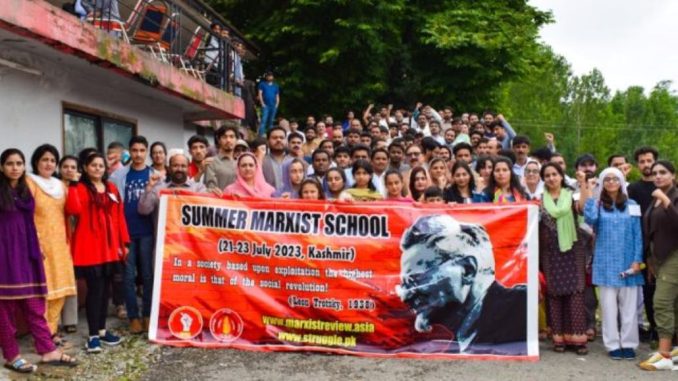
By Badar Rafiq
A three-day Summer Marxist School, July 21 to 23, was organized by The Struggle at Koiyan in Rawalakot, Poonch district of Pakistan held Kashmir. Hundreds of revolutionary youth from all over the country and its held areas arrived at Rawalakot on July 20 to participate in the School, where they were warmly welcomed by the organizing committee of the Jammu Kashmir National Students Federation (JKNSF). A total of 250 participants, including 29 women, took part in the Marxist School. In addition to debates on four main topics, the event included a cricket tournament, badminton matches, tours to tourist sites, poetic gatherings, music, and traditional Kathak dance, along with other cultural and literary activities. The syllabus for the discussion at the Marxist School was sent online well in advance.
On the morning of July 21, after breakfast, all the revolutionary youth who attended the school gathered in the hall for the first session. The vibrant red banner adorned the stage. The banner carried the words of the leader of the Russian Revolution, Leon Trotsky, “In a society based upon exploitation, the highest moral is that of the social revolution”. Before formally commencing the discussions on the designated topics, the former Central President of the JKNSF, Rashid Sheikh, welcomed the participants to the school and briefed them about the school’s arrangements and discipline.
Following the opening remarks, the first session of the school started. The session was chaired by Sangeen Bacha. In this session, the topic “Crises and Movements in the Contemporary World” was illuminated in detail by Aliza Islam, the General Secretary of JKNSF Poonch University. She shed light on the contradictions of capitalism, ongoing crises, and movements around the world. After the lead off, a series of questions were raised, and the discussion continued until the end of the session. Participants, including Abid Buzdar, Arooba Mumtaz, Amir Khurshid, Moiz Akhtar, Haji Shah, Dawood Hasrat, Israr Shabeer, Saifullah, Majib Khan, Awais Qarni and Imran Kamyana, engaged in dialogue, discussing the questions and exploring various angles of the perspectives. Aliza Islam concluded the session, bringing together all the points discussed during the debate.
After lunch, on Friday, the second session of the school began. In this session, titled “Socialist Response to the Environmental Crisis”, the responsibilities of the chair were carried out by Dr. Aftab and Kapil Dev elaborated on the socialist revolutionary program for rescuing the environment from the clutches of capitalist exploitation. Following his lead off, Maryam Khan, Sana i Muhammad, Awais Rafiq, Majib Akbar, Lata, Faizan Tariq, Saima Batool and Majid Khan further advanced the discussion under the light of questions. Finally, Kapil Dev wrapped up all the discussions in his sum up of the session.
On the school’s second day, after breakfast on July 22, the third of the school commenced with a comprehensive debate on the topic “The Transitional Program for Socialist Revolution”. The session was chaired by Saima Batool and Omar Abdullah, the organizer of RSF North Punjab, led the session. After the lead-Off, a series of questions followed to propelled the discussion forward, carried out by other comrades including Rajesh Kumar, Namos, Luqman, Lata, Umair Khurshid, Altamash Tasdduq, Zafar Ullah, Arslan Shani, Rehana Akhtar, Haris Qadeer and Imran Kamyana. They discussed the strategies, significance, and necessity of the transitional program for socialist revolution. Omer Abdullah brought the session to a close, summarizing all the discussions. During this time, various comrades added to the revolutionary vigor of the participants with revolutionary songs and poems. Among them were Maryam Haris, Saleem Nashad, Jawad Ahmed, Majid Khan, Zamar Haris, and others.
On the second day, after lunch, a friendly cricket tournament took place. Teams from Jammu Kashmir, North Punjab, Faisalabad, Khyber Pakhtunkhwa, Multan, Sindh, Balochistan, and Southern Punjab participated. Besides the cricket tournament, friendly badminton matches were also played, and various groups went on sightseeing trips to the Banjosa Lake and Toli Pir other nearby places.
On Sunday, the last day of the school, after breakfast, the final and fourth session of the school was held. The topic of discussion in this session was “Tasks of Revolutionary Youth Today”. Awais Qarni, the central organizer of RSF, led this session. Comrades from all regions presented detailed reports on the current situation and the future action plan. Afterward, open discussions began, and Khalil Babar, the central president of JKNSF furthered the discussion by shedding light on the general situation of revolutionary work in Kashmir and the role of JKNSF.
In addition to this, Anwar Panhwar and the editor of fortnightly The Struggle, Rang Elahi, expressed their views on the current situation and the significance of holding this successful school. Haris Qadeer on behalf of host region (Kashmir) congratulated all the revolutionary youth on the successful organization of the school and presented the financial report of the school.
In the end, Imran Kamyana summed up the school with the determination that this activity would be an important milestone in the difficult journey of socialist revolution and that the participants would take the revolutionary work forward with full vigor. The school was formally concluded with the singing of international and revolutionary songs.
















